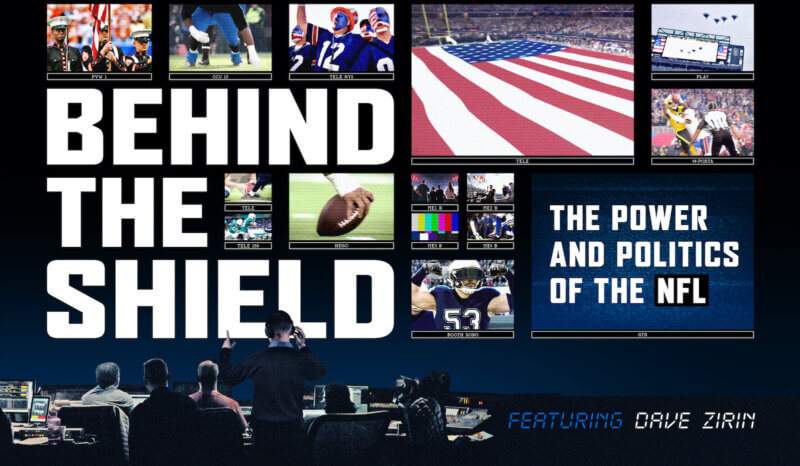Ready for some football? We talked to Dave Zirin about the politics and cultural power of the NFL.

With the new NFL season set to kick off tonight, we asked acclaimed Nation magazine writer Dave Zirin what’s on his mind about America’s most popular and influential sports league. Zirin is the star and co-producer of MEF’s new film Behind the Shield: The Power & Politics of the NFL, which is now streaming on Kanopy through university and public libraries and is also available in multiple other formats. The interview has been lightly edited for clarity and length.
MEF: With the new NFL season set to kick off tonight, what’s on your mind about America’s favorite sports league?
DAVE ZIRIN: I always say the toughest part of making Behind the Shield was stepping away and finishing because the league is always providing new material. Right now, I’m thinking about the NFL and [Commissioner] Roger Goodell’s announcement that “End Racism” will no longer be printed behind the end zones. Their performative, paper-thin anti-racism is no more. They are clearly choosing to reflect the broader reactionary trends in our society instead of challenging them, even though this is a league built upon Black players and the harm done to Black bodies for largely white consumption. It’s an argument we make in the film, but they’re certainly being stark about it with this quite literal erasure.
MEF: In Behind the Shield, you also say the NFL is something all Americans should grapple with – regardless whether they’re NFL fans or not, or even sports fans. Why do you say that?
DZ: The NFL is the closest thing we have in this country to a national language or even religion. It’s the most popular form of entertainment by a mile and – other than Barbie – the last gasp of a monoculture. I will shout this from the tallest buildings for as long as I’m upright: being aware of the politics and ideas that surround the NFL is vital to understanding how his country ticks.
MEF: In Behind the Shield, as with most of your writing and work over the years, your focus is less on the nuts and bolts of the game itself than the way the NFL reflects and in turn reinforces a certain political, cultural, and ideological worldview. Can you talk about that?
DZ: There are enough people talking about the “nuts and bolts of the game of football.” That’s a 24/7/365 operation. I think doing that, however, makes you miss the forest for the trees. The game is one thing. The game that surrounds the game – how the sport shapes our culture – is another terrain entirely.
MEF: If past trends hold, and there’s no reason to think they won’t, we can expect the 2023 NFL season to continue the league’s gravity-defying ratings dominance. How do you explain the NFL’s mind-boggling, endlessly growing popularity despite the avalanche of negative headlines we’ve seen about the league in recent years?
DZ: The league is successful because this is a violent country but in a contradictory fashion it’s also an atomized country where people crave a sense of community. The NFL has brilliantly set itself up to check both of those boxes. There is the thrill of violence, but also the thrill of belonging. No other sport – and no other spectacle of violence – is able to do that nearly as effectively. Even college football – by viewership numbers alone – isn’t close.
MEF: What would you say to educators who might be interested in looking at the NFL as a cultural and political phenomenon in their classes, but may not feel familiar enough with football to tackle the subject?
DZ: One of the joys of showing Behind the Shield around the country has been to show it to non-football fans. This is because even if they know nothing about football, they’re aware of how it has shaped their family, friends, and even their upbringing. We’re trying with this project to speak directly not just to the fan but to the non-fan because the politics of this sport are utterly fascinating. I have heard from more than a few people, “I am not a football person. I love this film.”
MEF: Anything else you think we should look for as the new season descends on us?
DZ: Be conscious of what the people in your lives are consuming, because they’re being shaped by it at all times. If we want to shape this sport – and our culture – we need the tools to do so. In these dire times, there is an urgency to understand the NFL. I hope we are collectively up to that task.

